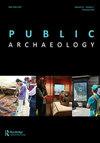The Freedom of Archaeological Research: Archaeological Heritage Protection and Civil Rights in Austria (and Beyond)
IF 0.9
4区 历史学
0 ARCHAEOLOGY
引用次数: 11
Abstract
Archaeologists like to think that heritage protection laws serve the purpose of protecting all archaeology from damage. Thus, provisions like that of §11 (1) Austrian Denkmalschutzgesetz or Art. 3 i-ii of the Valletta Convention are interpreted as a blanket ban on archaeological fieldwork ‘unauthorized’ by national heritage agencies, and a general prohibition against archaeological field research by non-professionals. The Austrian National Heritage Agency, the Bundesdenkmalamt, interprets the Austrian law in this way. Using the Austrian example as a case study, this paper demonstrates that this interpretation must be wrong, since, if it were true, it would revoke a fundamental civil right enshrined both in the Austrian constitution and the Charter of Fundamental Rights of the European Union: the unconditional freedom of research, which applies to archaeological field research as to any other kind of academic research, and extends equally to every citizen.考古研究的自由:奥地利(及其他国家)的考古遗产保护与公民权利
考古学家喜欢认为遗产保护法的目的是保护所有的考古不受破坏。因此,《瓦莱塔公约》第11(1)条或第3 -ii条的规定被解释为全面禁止国家遗产机构“未经授权”进行考古实地调查,并普遍禁止非专业人员进行考古实地调查。奥地利国家遗产局(Bundesdenkmalamt)是这样解释奥地利法律的。本文以奥地利的例子为例,证明这种解释一定是错误的,因为,如果这种解释是正确的,它将废除奥地利宪法和欧盟基本权利宪章中规定的一项基本公民权利:无条件的研究自由,这适用于考古领域的研究,也适用于任何其他类型的学术研究,并平等地延伸到每个公民。
本文章由计算机程序翻译,如有差异,请以英文原文为准。
求助全文
约1分钟内获得全文
求助全文

 求助内容:
求助内容: 应助结果提醒方式:
应助结果提醒方式:


